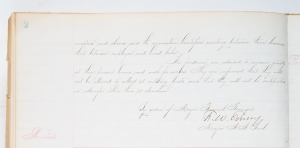“All slaves are free”: The 160th Anniversary of Juneteenth
Today is the 160th anniversary of Juneteenth – June 19, 1865, when Union Major General Gordon Granger issued General Orders No. 3 declaring that “all slaves are free.” By this point in the Civil War, organized fighting had come to a close. Confederate President Jefferson Davis was in custody, and his armies had surrendered or dissolved.
This spring, Emerging Civil War explored many of those surrenders in our Stacking Arms series. In June 1865, Granger was operating out of Galveston, a port city that had traded hands throughout the war. He was part of the broad Federal effort to reestablish the United States government’s authority, particularly in the areas that hadn’t been brought back under Union control before the Confederate government collapsed.
Before the war, that authority had been somewhat tenuous to begin with in many parts of the South and West, including Texas, which wasn’t long removed from its time as an entirely separate country. Now the Union Army was tasked with stamping out any lingering embers of rebellion, and bringing seceded regions up to speed with the steps the U.S. government had taken over 4 long years of war. That included Lincoln’s Emancipation Proclamation, which freed enslaved people in parts of the country that were in a state of rebellion – meaning that it could only be enforced as the Union Army advanced into Confederate territory, or as word of the Proclamation spread behind Confederate lines and slaves took steps to free themselves.
Granger’s Juneteenth order was effectively a reminder – some two and a half years after the fact – that the Emancipation Proclamation was no longer a dead letter in Texas. It was by no means the end of human bondage in the United States, but it was a symbolic milestone in the long road of emancipation, and is worth taking the time to read on this anniversary:
Headquarters District of Texas
Galveston Texas June 19 1865General Orders
No. 3The people of Texas are informed that in accordance with a Proclamation from the Executive of the United States, “all slaves are free”. This involves an absolute equality of personal rights and rights of property between former masters and slaves and the connection heretofore existing between them becomes that between employer and hired labor.
The freedmen are advised to remain quietly at their present homes, and work for wages. They are informed that they will not be allowed to collect at military posts and that they will not be supported in idleness either there or elsewhere.
By order of Major General Granger
F.W. Emery
Maj. A.A. Genl.


The History of the United States cannot be told without the History of the slaves who added wealth to the Nation and helped to build this nation, and didn’t participate any benefits.
While Granger delivered Order No. 3, it was at the direction of Major General Philip Sheridan. Here is Sheridan’s message to Granger:
“On your arrival at Galveston assume command of all troops in the State of Texas; carry out the conditions of the surrender of General Kirby Smith to Major-General Canby; notify the people of Texas that in accordance with the existing proclamation from the Executive of the United States ‘all slaves are free’; advise such freed-men that they must remain at home; that they will not be allowed to collect at military posts, and will not be supported in idleness. Notify the people of Texas that all acts of the Governor and Legislature of Texas since the ordinance of secession are illegitimate. Take such steps as in your judgment are most conducive to the restoration of law and order and the return of the State to her true allegiance to the United States Government.”
While Granger issued Order No. 3, it was under the instruction of Major General Philip Sheridan. See Sheridan’s instruction below:
“On your arrival at Galveston assume command of all troops in the State of Texas; carry out the conditions of the surrender of General Kirby Smith to Major-General Canby; notify the people of Texas that in accordance with the existing proclamation from the Executive of the United States ‘all slaves are free’; advise such freed-men that they must remain at home; that they will not be allowed to collect at military posts, and will not be supported in idleness. Notify the people of Texas that all acts of the Governor and Legislature of Texas since the ordinance of secession are illegitimate. Take such steps as in your judgment are most conducive to the restoration of law and order and the return of the State to her true allegiance to the United States Government.”
Interesting that this event of largely limited and symbolic import gets the holiday rather than the passage or ratification of the Thirteenth Amendment. Lincoln pushed the Thirteenth in part because of his concern about the continuing legality of the Emancipation in a post war world.
All slaves were not free. Slavery did not end until December 6, 1865, and were still being held in West Virginia, and perhaps other Northern states as well until that date.